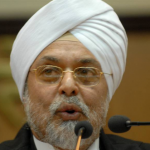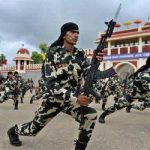Military coup in Turkey
- An army group in Turkey declared a coup (an attempt to overthrow the government) and martial law late on Friday (July 15, 2016), saying they had “taken control of the country”. It aimed at ousting the democratically elected government.
- The conspirators were mainly from the Air Force, the military police and armored units.
- But thousands of people heeded a call by President Recep Tayyip Erdogan, taking to the streets to oppose the toppling of the government.
- The forces loyal to President Erodgan’s government regained control of the military within hours of the coup attempt.
- Over 6,000 people have been detained by Turkish authorities.
- Erodgan put the blame of the coup attempt on the movement led by Turkey’s Islamic scholar Fethullah Gulen living in self-imposed exile in the U.S.; and called for his extradition from the U.S.
- But the scholar denied any responsibility, saying he had no knowledge of it.
Reasons for the coup
-
The Republic of Turkey was created as a secular state in 1923 after the collapse of the Ottoman empire at the end of World War I. Its founder Mustafa Kemal Ataturk was president until his death in 1938.
-
Prime Minister since 2003, Erdogan was elected president in 2014, the first Turkish President to be directly elected by the people, with plans to alter the constitution to give the previously ceremonial presidency far greater executive powers.
-
Opponents of Erodgan feel that his rule had become increasingly authoritarian, which included a government shake-up, crackdown on dissidents and opposition media and renewed conflict in the mainly Kurdish areas of the South-East.
-
His AK Party, having Islamic roots, has for long had a strained relationship with the military and the nationalists in a state that was founded on secular principles after World War 1. The Turkish military considers itself as a guardian of Kemalism and secularism.
-
His conservative religious vision for Turkey’s future has also alienated many ordinary citizens who accuse him of authoritarianism. Police used heavy force in 2013 to suppress mass protests demanding more freedom.
- A number of steps were taken by the government in its initial years, such as limiting the jurisdiction of the military court and bringing the appointment of senior military figures under civilian control to weaken the military’s influence. In a way, Erodgan alienated the military.
- Erodgan also got several generals and other senior commanders arrested for allegedly plotting against the government.
History of coups in Turkey
It is the military’s commitment to the secularist ideology of the iconic Turkish leader Mustafa Kemal Ataturk, and to stability, that has been the driving force behind these takeovers.
- 1960- First coup in the Turkish Republic. President, Prime Minister and others were arrested and were tried for treason and other offences.
- 1971- Economic downturn led to widespread unrest. The military intervened again, in an effort to restore order.
- 1980- Clashed between left and right-wing groups. This led to another army coup. Thousands of people were arrested in the following years and dozens were executed.
- 1997- Military offered a series of recommendations after rise of the Welfare Party. Government had no choice but to accept the recommendations. The Prime Minister was forced to resign.
The military has not seized power directly since 1980.
Implications
- Turkey is one of the main supporter of opponents of Syrian President Bashar al-Assad in that country’s civil war, host to 2.7 million Syrian refugees and launchpad last year for the biggest influx of migrants to Europe since World War Two.
-
Turkey, a NATO member since 1952, is a key partner in US-led efforts to defeat the Islamic State group, and has allowed American jets to use its Incirlik air base to fly missions against the extremists in nearby Syria and Iraq. A coup against the democratically elected government could make it difficult for the United States to continue to cooperate with Turkey.
-
The demand for extradition of the Islamic cleric from the United States could further increase tension between both the countries.
-
If Erdogan continues to crackdown aggressively on the opposition and jail dissidents not involved with the coup attempt, this could further strain the U.S.-Turkey relations.
- Erodgan vowed to clean up the military. A destabilized military will be unable to provide any additional support to the US-led fight against the ISIS.
- Turkey is also a major recipient of U.S. arms sales, ranking third among importers of American weapons in 2015. Such sales might be put in danger by a military experiencing widespread upheaval.
- A distracted Turkey would find it difficult to prevent foreign fighters, wanting to join the IS, from transiting through the country.
- The coup attempt claimed more than 250 lives. There is a possibility of armed clashes between various political camps.
- Millions of Syrians have fled to Turkey to escape the Civil War.Turkey had recently struck a deal with the EU to control the number of refugees going to Europe, with the EU providing Turkey billions of dollars in aid. In the coup fallout, these refugees could seek to escape Turkey for Europe further complicating the situation.
- It will impact tourism in the country with Indian tourists already avoiding the country in the aftermath of the airport terror attacks in Turkey.
- The violence will also hurt investor confidence in the country.
Map Work:
- Locate Bosphorus Strait.
- Countries sharing borders with Turkey.











